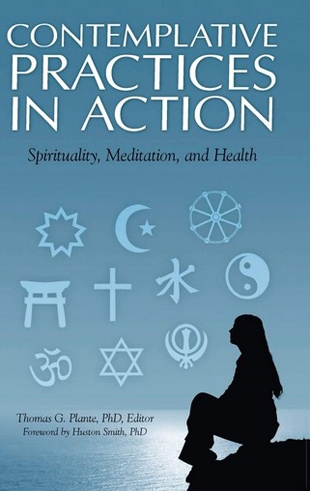The editor, Thomas G. Plante, PhD, ABPP, is the Augustin Cardinal Bea, S.J. University Professor, professor of psychology at Santa Clara University, Santa Clara, CA, and directs the Applied Spirituality Institute. He is an adjunct clinical professor of psychiatry and behavioral sciences at Stanford University School of Medicine, Palo Alto, CA. He has published many books, including Spiritual Practices in Psychotherapy: Thirteen Tools for Enhancing Psychological Health. He maintains a private clinical practice as a licensed psychologist in Menlo Park, CA.
Plante has gathered experts in various traditions to elucidate how contemplative practices are practiced and how they may improve health, well-being, and stress-management, as well as offer wisdom and healing. Experts such as Jill E. Bormann, PhD, RN, a research nurse scientist at the VA San Diego Healthcare System and an adjunct associate professor at San Diego State University School of Nursing; David Levy, PhD, a professor in the Information School at the University of Washington; Gerdenio Manuel, SJ, PhD, an associate professor of psychology and rector of the Santa Clara University Jesuit Community; and Michelle J. Pearce, PhD, an assistant clinical professor in the Duke University Medical Center are experienced in integrating contemplative practices with their respective fields, such as psychology, nursing, and pastoral care.
Plante intentionally includes Eastern and Western traditions. Chapters are devoted to Mindfulness-Based Stress Reduction, Passage Meditation, Christian Centering Prayer, Mantram/Holy Name repetition, Jewish Contemplative Practices, a perspective on an Islamic Contemplative Approach, the path of Yoga as derived from Indian philosophy, and transformation through Zen Buddhism. The book strives to integrate consideration of tradition, practice, and science, including case studies and relevant findings. For example, the chapter on mantram repetition includes summaries of published research studies on mantram repetition for combat veterans with PTSD, family caregivers of veterans, mothers in labor, and adults living with HIV.
In their chapter on Jewish contemplative practices, Zari Weiss and David Levy state, “Though there are times that belief leads to experience, most often, we have seen, it is experience that leads to belief. And if experience doesn’t arise on its own, it can be invited, or perhaps better, awakened.” For this very reason, Plante’s collection of highlights from multiple traditions is a valuable resource. In the words of Huston Smith, who was the Thomas J. Watson Professor of Religion and Distinguished Adjunct Professor of Philosophy, Emeritus, Syracuse University, this collection provides “resources for transforming and augmenting the human spirit.”
A cautionary note:
In her discussion of contemplative practices in Islam, Aisha Hamdan Utz, PhD, cautions against repeating the word Allah or one of Allah’s names as a form of dhikr; she refers to this practice as an “innovation,” by which she connotes the Arabic term bid’ah (heretical doctrine or practice). Hamdan Utz purports to be presenting “traditional Sunni Islam.” Hamdan Utz is a professor at the College of Medicine at King Saud Bin Abdulaziz University of Health Sciences in Riyadh, Saudi Arabia. Because Saudi Arabia is where Wahhabism/Salafiyya is the dominant form of Islam and where required religious curriculum teaches Wahhabism/Salafiyya, which has been referred to as ‘ultraconservative’ by Muslims that follow other schools of thought, I am uncertain whether Hamdan Utz’s position regarding repeating the word Allah is in fact representative of traditional Sunni Islam. Some conservative and ultraconservative Muslims believe that if a practice was not done by Muhammad himself, it is an innovation that should be avoided. Other Muslims criticize the logic behind this opinion, pointing out that by this logic Muslims would not pray in modern buildings, engage in exegesis of the Qu’ran, evaluate the authenticity of the sayings of Muhammad, etc., all of which are widely accepted Islamic practices.
